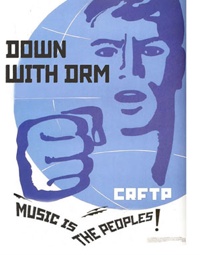 Now this would be one heck of an early present: The Entertainment Retailers Association (ERA), which represents retailers who sell entertainment products such as music, DVDs and games, has asked the music industry to end digital rights management by Christmas.
Now this would be one heck of an early present: The Entertainment Retailers Association (ERA), which represents retailers who sell entertainment products such as music, DVDs and games, has asked the music industry to end digital rights management by Christmas.
The ERA blames digital copy protection for the slow growth of digital music sales in the UK. ERA Director Kim Bayley told the the Financial Times that DRM is “stifling growth and working against the consumer interest.”
As evidence, pre-Christmas sales are not off to a bang-up start. The music industry makes at least 40 percent of its annual revenue in the fourth quarter culminating at Christmas. The traditional sales build up has started later than usual, and it has industry participants like the ERA nervous.
 The ERA — rightly — says that consumers are increasingly angry that copy protection systems impose limitation on where and how the content they’ve purchased can be used. Consumers are also confused over the fragmentation of the DRM formats, often incompatible, that are used, leaving them to wonder whether the music they’ve bought will work on all their different devices.
The ERA — rightly — says that consumers are increasingly angry that copy protection systems impose limitation on where and how the content they’ve purchased can be used. Consumers are also confused over the fragmentation of the DRM formats, often incompatible, that are used, leaving them to wonder whether the music they’ve bought will work on all their different devices.
“There are certainly experiments, but there’s still a certain element of resistance within the music industry,” Bayley said. “At the moment, (DRM) just puts consumers off.”
One of the largest record labels, EMI, has made its catalogue available free of DRM. Others, however, have refused. So what is the chance of the Universal Music Group or Sony BMG opening up their entire catalogues free of copyright protection schemes before Christmas?
About as likely as me finding a Porsche under the Christmas tree.
Speaking of the music business
David Carr, an analyst for Jupiter Media, says, “Digital is where the growth is, but it won’t be enough to ‘save the industry.’ “
His point is that the sales of downloads and on-demand subscription services will not compensate for declining CD sales. You can read more detail at the Juniper blog.
